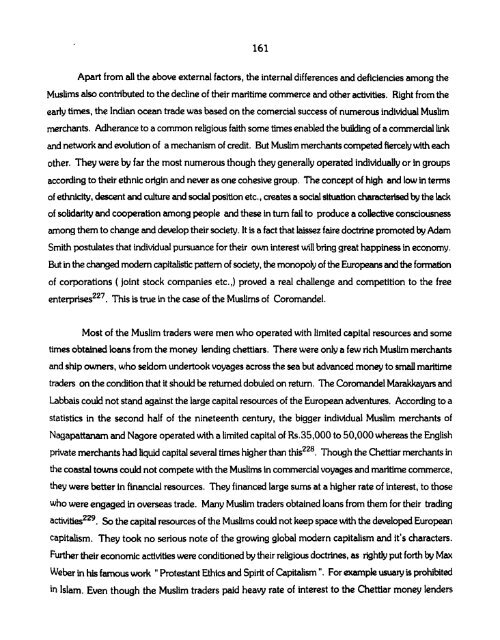maritime activities economy and social customs of the muslims of ...
maritime activities economy and social customs of the muslims of ...
maritime activities economy and social customs of the muslims of ...
Create successful ePaper yourself
Turn your PDF publications into a flip-book with our unique Google optimized e-Paper software.
Apart from all <strong>the</strong> above external factors, <strong>the</strong> internal differences <strong>and</strong> deficiencies among <strong>the</strong><br />
Muslims also contributed to <strong>the</strong> decline <strong>of</strong> <strong>the</strong>ir <strong>maritime</strong> commerce <strong>and</strong> o<strong>the</strong>r <strong>activities</strong>. Right from <strong>the</strong><br />
early times, <strong>the</strong> Indian ocean trade was based on <strong>the</strong> comercial success <strong>of</strong> numerous individual Muslim<br />
merchants. Adherance to a common religious faith some times enabled <strong>the</strong> building <strong>of</strong> a commercial link<br />
<strong>and</strong> network <strong>and</strong> ewlution <strong>of</strong> a mechanism <strong>of</strong> credit. But Muslim merchants competed fiercebwith each<br />
o<strong>the</strong>r. They were by far <strong>the</strong> most numerous though <strong>the</strong>y generally operated individually or in groups<br />
according to <strong>the</strong>ir ethnic orlgin <strong>and</strong> never as one cohesive group. The concept <strong>of</strong> high <strong>and</strong> low in terms<br />
<strong>of</strong> ethnlcity, doscent <strong>and</strong> culture <strong>and</strong> <strong>social</strong> position etc., creates a d situation characted by <strong>the</strong> lack<br />
<strong>of</strong> solidarity <strong>and</strong> coopemUon among people <strong>and</strong> <strong>the</strong>se in turn fail to produce a collective consciousness<br />
among <strong>the</strong>m to change <strong>and</strong> dewlop <strong>the</strong>ir society. It is a fact that laissez faire doctrine promoted by Adam<br />
Smith postulates that individual pursuance for <strong>the</strong>ir own interest will bring great happiness in <strong>economy</strong>.<br />
&It in <strong>the</strong> changed modem capitalistic pattern <strong>of</strong> society, <strong>the</strong> monopiy <strong>of</strong> <strong>the</strong> Europeans <strong>and</strong> <strong>the</strong> formation<br />
<strong>of</strong> corporations ( joint stock companies etc.,) proved a real challenge <strong>and</strong> competition to <strong>the</strong> free<br />
enterp~ises~~~. This is hue in <strong>the</strong> case <strong>of</strong> <strong>the</strong> Muslims <strong>of</strong> Corom<strong>and</strong>el.<br />
Most <strong>of</strong> <strong>the</strong> Muslim traders were men who operated with limited capital resources <strong>and</strong> some<br />
times obtained loans from <strong>the</strong> money lending chettiars. There were only a few rich Muslim merchants<br />
<strong>and</strong> ship owners, who seldom undertook voyages across <strong>the</strong> sea but advanced money to small <strong>maritime</strong><br />
traders on <strong>the</strong> condition that it should be returned dobuled on return. The Corom<strong>and</strong>el Marakkayars <strong>and</strong><br />
Labbaii could not st<strong>and</strong> against <strong>the</strong> large capital resources <strong>of</strong> <strong>the</strong> European adventures. According to a<br />
statistics in <strong>the</strong> second half <strong>of</strong> <strong>the</strong> nineteenth centuy, <strong>the</strong> bigger individual Muslim merchants <strong>of</strong><br />
Nagapattanarn <strong>and</strong> Nagore operated with a limited capital <strong>of</strong> R5.35.000 to 50.000 whereas <strong>the</strong> English<br />
private merchants had liquid capital several times higher than thiszz8. Though <strong>the</strong> Chettiar merchants in<br />
<strong>the</strong> coastal towns could not compete with <strong>the</strong> Muslims in commercial voyages <strong>and</strong> <strong>maritime</strong> commerce,<br />
<strong>the</strong>y were better in financial resources. They financed large sums at a higher rate <strong>of</strong> interest, to those<br />
who were engaged in overseas trade. Many Muslim traders obtained loans from <strong>the</strong>m for <strong>the</strong>ir trading<br />
<strong>activities</strong>229. So <strong>the</strong> capital resources <strong>of</strong> <strong>the</strong> Muslims could not keep space with <strong>the</strong> developed European<br />
capitalism. They took no serious note <strong>of</strong> <strong>the</strong> growing global modern capitalism <strong>and</strong> it's characters.<br />
Fur<strong>the</strong>r <strong>the</strong>ir economic <strong>activities</strong> were conditioned by <strong>the</strong>ir religious doctrines, as rightly put forth by Max<br />
Weber in his famous work " Protestant Ethics ad Spirit <strong>of</strong> Capitalism ". For example usuay is prohibited<br />
in Islam. Even though <strong>the</strong> Muslim traders paid heay rate <strong>of</strong> interest to <strong>the</strong> Chemar money lenders

















